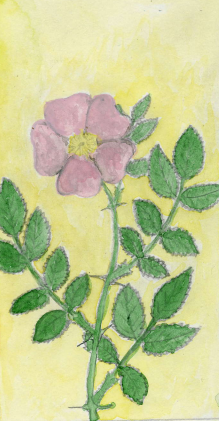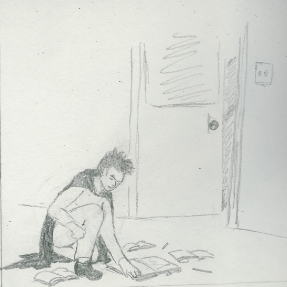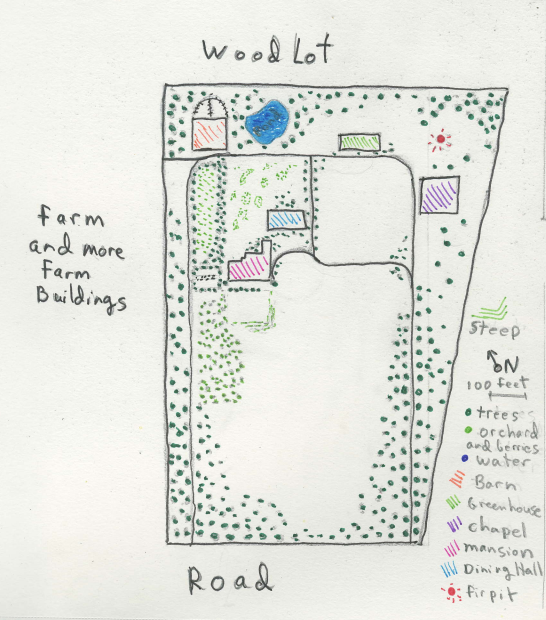The snow last week didn't last long. It drifted up, inches and inches,
fluffy and cozy, but it was a warm snow, with big fat flakes, and started
melting soon after. It’s been melting steadily now for days, and this morning I
found big patches of bare ground, especially in the open places. I can’t walk
out in it much, everything’s mud, but it’s a sight. I haven’t seen bare ground
since I’ve been here.
It’s weird, every other time I’ve come to a new place and stayed it’s been
in the summer or the fall—not counting ski trips, I’ve never been anywhere for
the first time in the snow. So now I’m finding out all sorts of things about this
campus that I never knew, because they were under the snow.
For example, the open area out near the back of the barn isn't a clearing,
it's a pond. It’s not open water yet, but I noticed that grass was appearing from
under the snow everywhere else and not there, so I got curious, braved the mud,
and walked out. And it’s a pond.
Elsewhere, I noticed there’s something odd about the grass. It’s longish and
uneven, and there are little shrubs in it in places, prickly things, with
broken, chewed-off stems. Chewed? Frozen chucks of horse turd are coming out of
the melting snow, too. These aren’t lawns, I don’t think, they’re pastures. Of
course that makes sense, there are sheep and goats and horses here, and grazing
them on campus would reduce the amount of hay we need to buy. And I don’t think
I’ve seen a lawnmower anywhere.
And the roads aren't paved. The campus roads weren't plowed, they just
packed the snow down and added gravel and sawdust for traction, but I'd always
thought there was pavement under there. Instead, it's just gravel and little
chunks of crushed cinder block. Of course, the roads are melting slowly,
because the snow is packed, but there are a few open patches.
In the open patches of road I’m seeing, here and there, pieces of broken asphalt,
just crumbs, little chunks, so obviously the roads were paved at some point. I
asked about this, and apparently when this school moved in the campus was s dilapidated,
but fairly standard, boys’ private boarding school. There was a school
building, several free-standing dorms, a gym, an athletic field…the place had
been abandoned for five years, and some of the dorms had been closed even
before that, as enrollment dropped, so everything was grown over and moldy and
starting to fall to ruin. The top floor of the Mansion had even burned in a lighting-struck
fire. So, when our school came in they had a lot of fixing up to do, and they simply
razed the buildings they didn’t need. They unpaved the roads, rehabilitated the
ground in the athletic fields and turned it into our farm, and apparently spread
the cinderblock and concrete pads in chucks to gravel the roads.
It’s interesting that there were obviously cinderblock buildings here,
apparently a lot of them, but there are none here now. Presumably the
better-built buildings survived abandonment better, and given the choice
between saving the Mansion and saving a cinder-block dorm, I’d save the
Mansion. It’s a beautiful building. But, and I’ve thought of this, a parent
coming up the hill of the main driveway would not have seen cinderblock
buildings first. They would have seen the Mansion and, coming a little closer,
would have seen Chapel Hall, which is weirdly imposing and, as I noticed my
first day, looks vaguely collegiate, being brick with ornate white trim.
But they would not have noticed any
cinderblock buildings. If all the buildings were where I think they were, the
more cheaply constructed places would have been either out of the immediate
line of sight, hidden by trees, or behind Chapel Hall. I never thought about it
before, but a private school has to appeal to parents, or their source of
revenue dries up. I don’t suppose the business plan required being honest about
how students actually live.
The message of the campus now is very different, if there even is an
intended message. Strangers come here so very rarely. I used to work at a
landscaper’s when I was in high school, so I notice landscaping, and the campus
is definitely planned, but it’s hardly manicured. Again, there are layers of
history—avenues of old trees lining the long driveways and an orchard of
apples, pears, and peaches must go back to the farm. Foundation plantings of
shrubs and specimen trees must date to the boarding school, because they are
associated with buildings that are. But the straight lines and clean plantings
are all either added to or interrupted. Nothing here is straight, nothing looks
cleaned up. Most of the plants look kind of odd, maybe they’re species I’m not
used to, or something, I can’t tell. It looked kind of normal and sedate under
the snow, and I imagine it must be riotously exuberant in the summer, with the
grass and flowers waving in the pastures and everything green, but at the
moment winter-bare trees and shrubs reach their crooked twig-fingers out from
wild hollows across the mud and rotten, slushy snow of spring, and it looks
kind of Grimm.
There’s so much history here, not that I know most of it, but I can see the
shadows of former incarnations of this place. Like the chunks of cinderblock
and asphalt from the boys’ boarding school, or the big, flat place on the front
lawn—I mean, pasture—a big square, with a short, steep embankment on one side
where it rises to meet the more normal-looking land in front of the Mansion,
and a longer, equally steep embankment where the ground falls off to meet the
natural slope on the other side. There must have been a building there, long
ago. Perhaps it was a barn, back when this was a wealthy horse farm?

The Mansion itself shows its history in layers. Once it was obviously a
large, but not ornate stone farmhouse, but that was expanded with extra rooms
and a new wing. Then, after the fire, we added the fourth floor (I don’t think
the building got much taller, though; the first and second stories have
fourteen foot ceilings while the third and fourth floors have eight foot
ceilings and reportedly are not as cold at night as I am), better insulation,
and passive solar heating measures like big windows on the southwest side. The
first floor is grand and much of it looks a lot like it probably did back in
the heyday of the horse farm, but the floors get progressively…less traditional
from there. There are photovoltaic panels on the roof.
And when I say the ground floor of the Mansion is traditional, I mean it is
traditional in mood and in a kind of general overview, but not in detail. The
Great Hall is all honey-colored wood paneling, with a grand staircase winding
up and around an open, vertical well of dusty, sunlit space rising three
stories up to a skylight in the floor of a patio the masters have up there. It
looks like a good place to host a ball. There’s a sunroom, called the Green
Room, off to one side full of plants and white wicker chairs and a little
fountain with fish in the basin. Except that the fountain is solar-powered, it
looks rather Victorian. The Rose Room, where we have some of our seminars and
things, is basically a sitting room, with rose-colored wallpaper and lots of
dried flowers—except
the pictures on the
walls are all antique-looking drawings (and even photographs!) of fairies and imaginary
animals. The Bird Room, next to it, is a formal dining hall all in dark wood
and glass display cases, but most of the display cases hold, not china, but
huge dead insects and spiders, mounted and pinned. Fossil shells, crystals, and
fans of feathers take up space. Eggs of exotic birds collect dust on their mottled
shells. Taxidermied birds—a raven, an egret, a gannet—and the mounted skeletons
of a hawk and a chicken all regard each other from the tops of shelves and
ancient writing desks. They’re all labeled, or I wouldn’t know what they are,
and I’m sure none of them except the chicken are new. The whole thing looks,
again, Victorian, but slightly askew. There’s a bench along the window, and you
can sit there and look out into an almost Japanese-looking garden where
copper-roofed bird-feeders in the shape of pagodas attract real, live birds.
Entirely modern binoculars, two pairs, hang from wrought-iron hooks by the
windows, and they are so powerful you can sit there and find out if birds have
nose-hairs, if you want to.
Sometimes, in the Mansion, you can hear voices, or people moving, near the
stairwell, and nobody is there.

And how did I get off on this tangent of description? Andy is back from
rehab, a lot clearer-headed than he was when he went in. He seems to be mildly
obsessed with the bicycles; he can’t seem to let go of his guilt. Aidan is home
from the hospital and growing well. Kayla is actually nursing him, so she
carries him around with her most of the time—I can’t say I ever expected to see
a twelve-year-old’s breast, but if even if I had, this would not have been the
context I anticipated. But unlike an adult mother she never has to worry about
babysitting. If Kayla wants to do something else, or if something goes wrong,
Sadie figures it out. And Aidan sleeps—or refuses to sleep—on the fourth floor
with Sadie, not in the dorm with us. We’re on the second floor, and Nora told
me that from the third floor they can sometimes hear the baby cry at night, but
we can’t. Kayla gets her sleep, or stays up late partying with us like a
teenager. No one will give her any alcohol, though—obviously, she’s
breastfeeding, but there’s her age, too. She complained that her mother always
let her taste drinks when she was a kid, but Meg, who is kind of matronly, said
“well, you’re not a kid anymore,” and Kayla hasn’t asked again.
It’s ten days till spring, or mid-spring, the way Kit says it, since she
says spring actually began in February, at Brigid, under all that snow. I don’t
know what they do here for the spring equinox, but I know enough to guess that
they’re going to do something. But you know what? I’m seven years older than
Kayla, I can vote, and Meg lets me drink even if the law doesn’t, but there’s
still enough of the boy in me that I’m really hoping that on the equinox we’ll
get chocolate.
[Next Post: Friday, March 15th: Interlude]




















